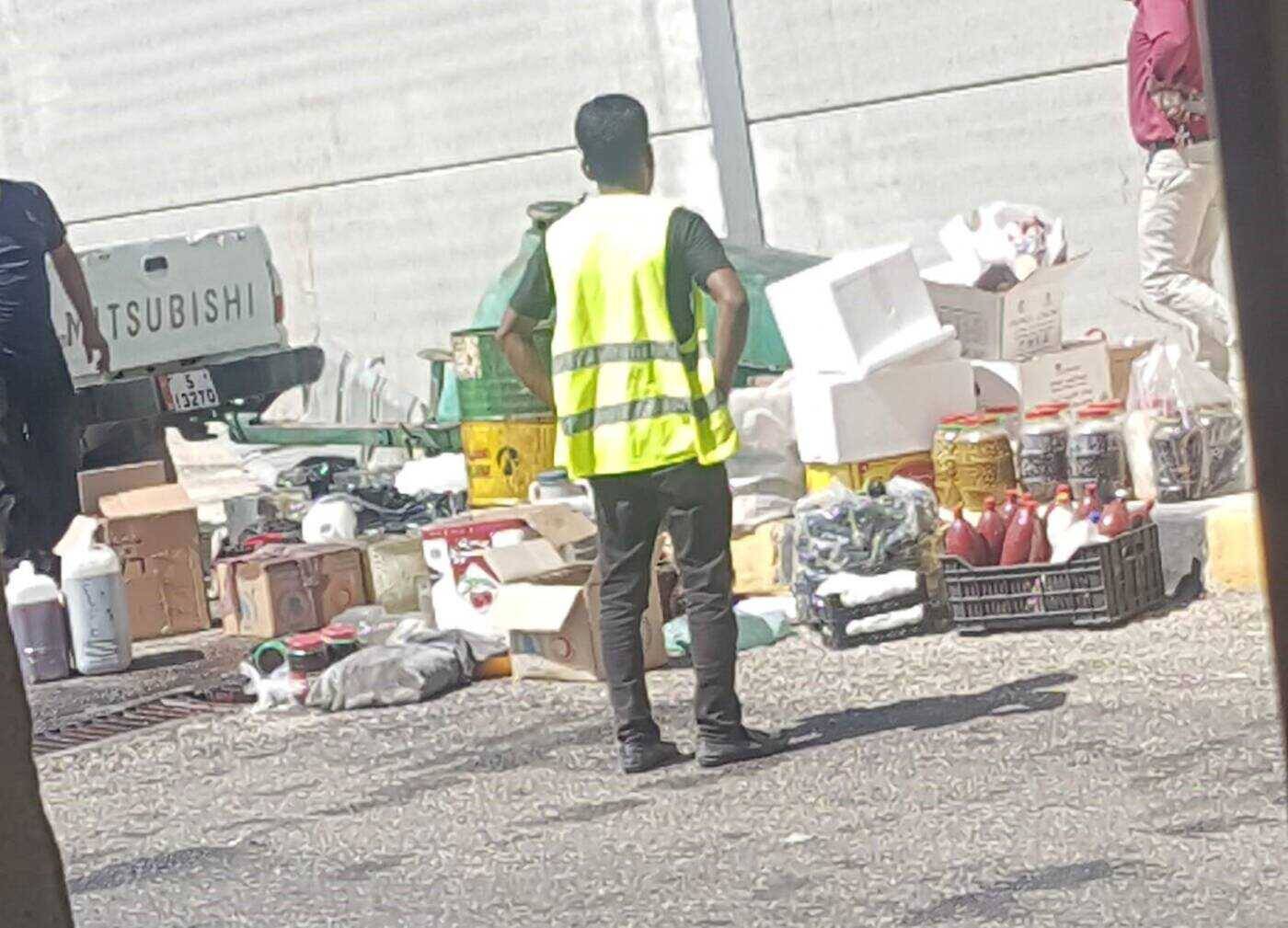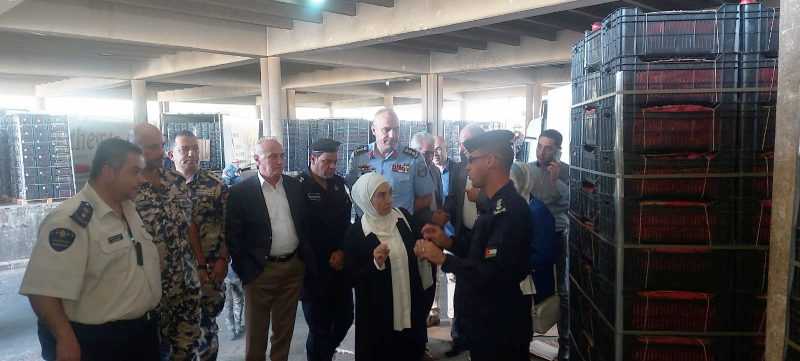At Jordan’s border, cholera prevention measures deprive Syrian travelers of the tastes of home
To prevent the spread of cholera, Jordanian border officials are confiscating and destroying most food items crossing the border from Syria. For travelers, it means losing a precious taste of home.
17 November 2022
AMMAN — Under a large metal hanger at the Jordanian Jaber Border Center, dozens of Syrian travelers wait in line, returning from visits to their native country en route to the Gulf countries where they live. Around them, empty boxes of vegetables, fruits, prepared foods and empty olive oil containers pile up, their contents poured into drainage channels at the border crossing.
Umm Ahmad, one of the travelers, described the scene when she crossed the border on October 28, and the raised voices of travelers shocked at the confiscation and destruction of their food items by Jordanian authorities. The 37-year-old tried to persuade a Jordanian customs inspector at the crossing not to destroy her own items, but “he told me he couldn’t violate the instructions,” she said.
In the end, all she could save was “a few pieces of fruit, to eat on the way back to Saudi Arabia.”
Jordan’s Ministry of Health and its affiliated Epidemiology Committee issued a decision on September 18 requiring Jaber Border Center customs agents to destroy unpackaged food items carried by travelers entering from Syria. The directive was a precautionary measure amid an ongoing cholera epidemic in Syria and neighboring Lebanon, and came after the Syrian regime’s Ministry of Health announced an increase in the number of cholera cases and deaths among those infected. Cholera, an acute bacterial disease, is mainly spread by ingesting food or water contaminated with Vibrio cholerae bacteria.
Jordan’s border measures are “ongoing, and will not change until the end of cholera cases in Syria and Lebanon, to guard against an outbreak in Jordan,” the country’s Adviser to the Prime Minister for Health Affairs, Adel al-Balbisi, told Syria Direct.
The decision to destroy foodstuffs entering Jordan from Syria through the Jaber crossing was made because most of these items are a “medium” for the spread of cholera, al-Balbisi said. Border staff are to destroy “all foodstuffs that are eaten raw, such as yogurts, cheeses and pickles, with the exception of tightly closed canned goods,” he said. Olive oil is also prohibited from entering Jordan.
On October 16, Jordan’s Ministry of Agriculture also banned the entry of food “shipments from Syria and Lebanon” into its markets until samples are taken and analyzed “by the Food and Drug Administration, to ensure they are free of the cholera germ.”
Psychological and financial losses
When the provisions Umm Ahmad brought with her from Syria, “cheese, labneh, clarified butter, makdous [oil-cured, stuffed eggplants] and olive oil,” were confiscated and destroyed in front of her, she felt as though she had lost a loved one. She recalled her “mother’s effort in making and preparing the foods, made from the bounty of my country, which I left with my husband and children in 2011.”
A few days before Umm Ahmad’s items were destroyed, Jordanian customs did the same with those of Abu Maher, 63. He brought them with him in his private car from Homs city, and was leaving Syria for the Saudi capital, Riyadh, where he works, when he was surprised by the precautions taken on the Jordanian side of the border.
Abu Maher tried to send the food items he had with him back to Homs in a taxi entering Syria from Jordan, but “the customs officers insisted on confiscating and destroying them, following orders,” he told Syria Direct. In all, he was carrying “20 liters of olive oil, a few boxes of Syrian sweets, various pickles, makdous and olives—worth a total of SYP 1 million [$192].”
Umm Ahmad sees confiscating provisions brought by Syrians leaving their country through Jordan as “an unfair and costly decision.” She lost food items worth SYP 1.5 million ($288 according to the parallel market exchange rate of SYP 5,210 to the dollar). The amount horrifies her when she thinks of the people of her country, as around 90 percent of Syrians live below the poverty line, with an average monthly income of SYP 92,000 ($17.50).
Abu Maher felt a “lump of sadness” at losing “the flavor of the local food that eases our longing for home, and brings back memories of the dining table with my two deceased parents.” Many Syrian expatriates like him “rely mainly on food supplies manufactured in their country,” he added.

A picture posted by one traveler in a private Facebook group of a worker standing in front of food items confiscated at the Jaber Border Center on the border between Jordan and Syria, 19/9/2022
But when Jordanian customs refused to allow Ahmad Salloum, another traveler, to take his provisions with him to Saudi Arabia in September, he did manage to send them back to Homs. “The cost of sending them back by taxi is nothing, financially or psychologically, in exchange for my family to benefit from the food rather than have it destroyed,” he told Syria Direct.
Salloum appears to be lucky, compared to other travelers. Syria Direct collected testimonies from multiple travelers whose food items were destroyed, and few were able to return it to its source.
A communication problem?
Bus driver Mustafa Haroub, who works with a company that transports passengers from Syria to Saudi Arabia, warns travelers not to carry food items before his bus departs. He informs them of Jordan’s decision to destroy them, but few comply. “They expect it is possible to convince Jordanian border officials to pass it through,” he told Syria Direct.
Even if some passengers were able to “hide some supplies and pass them through the Jaber border, they risk a fine of 500 Saudi riyals [$133]” levied on passengers who “reach the Saudi border with foodstuffs” in their luggage, Haroub said. Syria Direct reached out to Saudi authorities for clarification, but did not receive a response by the time of publication.
In response to complaints from Syrian travelers who told Syria Direct they were unaware of Jordan’s decision and the reasons for it, the Director General of the Jordanian Customs Department, Major General Jalal al-Qudah, said the directive has been circulated to all concerned parties, including travel and tourism companies.
Al-Qudah attributed Syrians continuing to carry unpackaged food, despite the ban, to attempts by “sailors”—a name given to those who smuggle food across the Syrian-Jordanian border—to bring in items for commercial purposes while claiming they are for “personal use.”
Jordan’s border concerns are heightened by a lack of transparency from the Syrian side regarding the extent of the cholera epidemic. While the Damascus government’s Ministry of Health announced a total of 1,398 cholera infections and 49 deaths on Tuesday, the World Health Organization recorded 24,000 suspected cases and 81 deaths as of November 1.
Waiting for the rest of the bus passengers to complete the search procedures at the Jordanian border last month, Umm Ahmad sat in her seat. She watched as piles of destroyed food supplies and empty gallon containers of oil grew, little by little. The mounds were a metaphor, she felt, for “our growing troubles.”
This report was originally published in Arabic and translated into English by Mateo Nelson.







